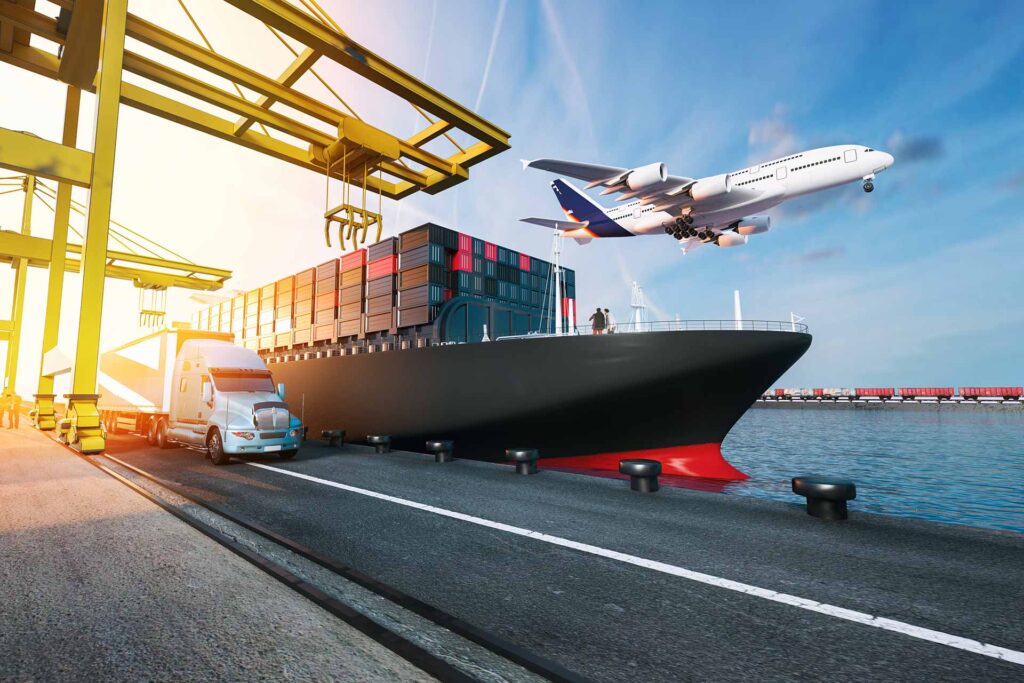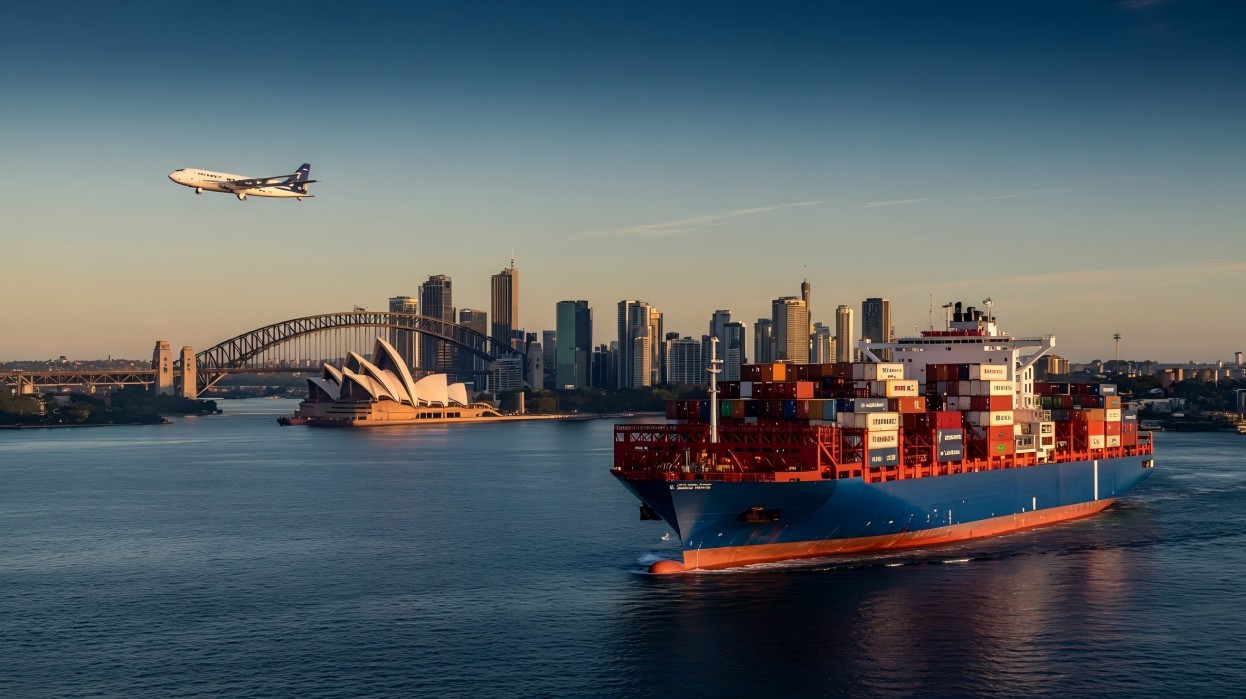Navigating the complexities of international shipping can be a daunting task, particularly when importing goods from China to South Africa. The process of hiring a freight forwarder is essential for ensuring that your shipments are coordinated efficiently and effectively. This step-by-step guide will provide you with the key insights necessary to understand freight forwarding, assess your shipping needs, and select the right freight forwarder for your business. By following these structured steps, you can streamline your logistics operations, enhance compliance with regulations, and ultimately optimize your supply chain efficiency. Whether you are new to importing or looking to refine your processes, this guide aims to equip you with the knowledge needed to make informed decisions in the freight forwarding landscape.
Related Article : Shipping From China To Jordan

Understanding Freight Forwarding
Freight forwarding plays a pivotal role in the global supply chain, serving as a vital link between manufacturers, suppliers, and customers. By understanding the fundamentals of freight forwarding, businesses can make informed decisions that can significantly impact their operational efficiency and cost-effectiveness.
What is Freight Forwarding?
At its core, freight forwarding is the process of organizing and coordinating the shipment of goods from one location to another on behalf of shippers. A freight forwarder acts as an intermediary between the shipper and various transportation services, ensuring that goods are transported safely and efficiently. They handle a variety of services, including:
- Transportation: Identifying the best transportation modes (air, sea, land) to fit the shipment’s needs.
- Documentation: Preparing and managing necessary shipping documents, such as bills of lading and customs clearance forms.
- Insurance: Offering insurance services to protect goods during transit.
- Customs Clearance: Facilitating the process of ensuring that shipments comply with all customs regulations.
Key Components of Freight Forwarding
Understanding the key components of freight forwarding can help importers and exporters navigate the complexities of international shipping. These components include:
- Logistics Management: Coordinating the movement of goods through various transportation channels to optimize costs and efficiency.
- Warehousing: Providing warehouse services for temporary storage of goods before they are dispatched or delivered.
- Supply Chain Solutions: Offering tailored solutions to address specific logistical challenges in the supply chain.
- Risk Management: Assessing potential risks and providing options for mitigating those risks through carefully structured logistics strategies.
By grasping these components, businesses can better appreciate how to leverage freight forwarding for their operational advantage.
Importance of Choosing the Right Freight Forwarder for Your Business
Choosing the right freight forwarder is a critical decision that can have far-reaching effects on a company’s supply chain efficiency and profitability. The right partner will ensure that shipments arrive on time, comply with regulations, and maintain cost-effectiveness.
Factors to Consider When Choosing a Freight Forwarder
-
Experience and Expertise: Assess the forwarder’s industry knowledge, especially in your specific field, such as shipping from China. An experienced forwarder will understand the nuances of international shipping, customs regulations, and compliance issues.
-
Service Range: Evaluate the range of services offered by the freight forwarder. A comprehensive one-stop logistics service provider like Dantful International Logistics can cater to various needs, including air freight, ocean freight, customs clearance, and door-to-door shipping services. This versatility can simplify logistics and reduce the need for multiple partners.
-
Reputation and Reviews: Research the freight forwarder’s reputation in the market. Customer reviews and case studies can provide insight into their reliability, customer service, and overall performance. A partner with a strong track record will likely be more trustworthy and efficient.
-
Cost Structure: Understand the pricing models and fees associated with the forwarder’s services. Look for transparency in costs and ensure there are no hidden fees that could impact your budget. Compare various forwarders to find the most cost-effective solutions without compromising service quality.
-
Technology and Communication: Evaluate the technology platforms used by the freight forwarder. Effective tracking systems, real-time updates, and easy communication channels can enhance visibility throughout the shipping process. A forwarder that embraces technology will likely offer more efficient service.
-
Customer Support: The level of customer support is crucial in addressing any issues that may arise during shipping. A reliable freight forwarder should offer prompt, knowledgeable customer service to assist you throughout the shipping process.
The Impact of a Trusted Freight Forwarder on Your Business
Selecting the right freight forwarder can lead to several benefits, including:
- Streamlined Operations: With a knowledgeable partner, you can simplify logistics and focus on core business activities.
- Cost Savings: A forwarder that understands the best shipping routes and methods can help minimize shipping costs.
- Risk Mitigation: A reputable forwarder will have systems in place to manage potential risks associated with international shipping.
In today’s competitive landscape, the choice of a freight forwarder can be a game-changer for businesses looking to import goods from China or other regions. For those seeking a reliable partner, Dantful International Logistics offers highly professional, cost-effective, and high-quality shipping services tailored to the needs of global traders.
By partnering with Dantful, you can ensure your freight forwarding needs are met with expertise and dedication, enhancing your overall supply chain efficiency and customer satisfaction.
You may be interested in the following related articles:
- Shipping From China To Tunisia
- Shipping From China To Sudan
- Shipping from China to Libya
- Shipping From China to Ghana
- Shipping From China To Tanzania
- Shipping From China To Nigeria
- Shipping From China To Morocco
- Shipping From China To Kenya
- Shipping From China To Angola
- Shipping From China To Algeria
Step 1: Identifying Your Shipping Needs
The first step in effective freight forwarding is to thoroughly identify your shipping needs. This involves understanding the nature of your goods, the volume and weight requirements, and the most suitable shipping method for your specific situation.
Determining the Type of Goods to Ship
Identifying the type of goods you intend to ship is critical. This involves distinguishing between different categories of products, such as:
- General Cargo: Standard products that do not require special handling.
- Perishable Goods: Items that are sensitive to temperature and need refrigeration, such as food and pharmaceuticals.
- Hazardous Materials: Goods classified as dangerous, which require special packaging and handling, such as chemicals or flammable items.
- Oversized Cargo: Large or heavy items that may require special equipment or permits for transportation.
Understanding the specific regulations and requirements associated with different types of goods is essential. For example, perishable goods will likely necessitate temperature-controlled shipping options, while hazardous materials will require compliance with strict safety regulations.
Assessing Volume and Weight Requirements
Another essential aspect of identifying your shipping needs is assessing the volume and weight of the goods you intend to ship. This assessment will influence several factors, including:
- Cost: Shipping costs are often determined based on weight and volume. Heavy or bulky shipments may incur higher fees, so understanding these metrics can help you budget accordingly.
- Packaging: The size and weight of your goods will determine the type of packaging needed. Proper packaging not only protects the goods during transit but also optimizes shipping costs by minimizing dimensional weight.
- Storage Considerations: If you require warehouse services to store your goods before shipping, understanding volume and weight requirements will help you select an appropriate storage solution.
Utilizing accurate volume and weight measurements will enable you to communicate effectively with your freight forwarder, ensuring you receive precise shipping quotes and recommendations.
Choosing the Appropriate Shipping Method (Air vs. Sea)
When selecting a shipping method, two primary options typically emerge: air freight and sea freight. Each method comes with its own advantages and considerations:
| Shipping Method | Advantages | Disadvantages |
|---|---|---|
| Air Freight | – Fast transit times – Ideal for urgent shipments – Generally safer and less prone to damage | – Higher costs compared to sea freight – Limited capacity for large shipments |
| Sea Freight | – Cost-effective for large volumes – Suitable for bulky or heavy items – Greater capacity for diverse types of cargo | – Longer transit times – Potential for delays due to weather or port congestion |
Factors to Consider
- Urgency: If time is of the essence, air freight will be the most suitable option. However, if your shipment can accommodate longer transit times, sea freight may offer significant cost savings.
- Type of Goods: As previously discussed, the nature of your goods can influence your choice. Perishable items often necessitate air shipping, while non-perishable bulk items are typically better suited for sea transport.
- Budget: Evaluate your budget constraints and determine which shipping method aligns best with your financial goals while still meeting your shipping requirements.
Step 2: Researching Potential Freight Forwarders
Once you have a clear understanding of your shipping needs, the next step is researching potential freight forwarders. This phase is critical in ensuring you select a reliable partner who can meet your logistical requirements.
Utilizing Online Platforms and Directories
The internet offers a wealth of resources for finding potential freight forwarders. Utilize online platforms and directories to create a shortlist of candidates. Key resources include:
- Freight Forwarding Directories: Websites like Freightnet and Freightos allow users to search for forwarders based on location, services offered, and customer ratings.
- Industry Associations: Organizations such as the International Federation of Freight Forwarders Associations (FIATA) provide directories of registered members who adhere to industry standards.
- Social Media and LinkedIn: Professional networking sites can connect you to freight forwarders and expose you to their networks. Engage with industry groups to gather recommendations and insights.
Evaluating Industry Experience and Specialization
Once you have a list of potential forwarders, evaluate their industry experience and areas of specialization. Consider the following:
- Years of Operation: A freight forwarder with a long-standing presence in the industry may have a proven track record of reliability and service quality.
- Specialization: Some forwarders specialize in specific markets or types of shipments. For example, if you are shipping electronics from China, seek out forwarders with experience in handling such goods.
- Global Network: A well-connected freight forwarder will have established relationships with carriers, customs authorities, and other logistics partners, ensuring smoother operations.
Checking Reviews and Testimonials
Before making a final decision, it is crucial to check reviews and testimonials from other clients. This can provide valuable insights into a freight forwarder’s performance, customer service, and reliability. Consider the following approaches:
- Online Reviews: Websites like Trustpilot or Google Reviews can offer customer experiences and ratings for freight forwarders.
- Case Studies: Request case studies or examples of successful shipments they managed in the past, particularly those similar to your shipment needs.
- Direct References: Don’t hesitate to ask potential freight forwarders for client references. Speaking directly with former clients can give you an authentic perspective on the forwarder’s capabilities.
By carefully identifying your shipping needs and thoroughly researching potential freight forwarders, you can lay a solid foundation for successful international shipping operations. For businesses looking for a committed partner in their freight forwarding needs, Dantful International Logistics represents a reliable choice with extensive services tailored for global traders.
Step 3: Evaluating Services Offered by Freight Forwarders
Choosing the right freight forwarder goes beyond just the basic shipping services they provide. A comprehensive evaluation of their offerings can ensure that your logistics needs are fully met. This includes understanding customs clearance and documentation, assessing additional services, and inquiring about tracking and customer support.
Understanding Customs Clearance and Documentation Services
Customs clearance is a critical component of international shipping, and freight forwarders play a significant role in this process. It involves ensuring that shipments comply with all relevant laws and regulations when entering or exiting a country.
Key Aspects of Customs Clearance
- Documentation Preparation: Freight forwarders must prepare various documents, including the bill of lading, commercial invoice, and packing list. Each document serves a unique purpose and must be filled out accurately to avoid delays.
- Duties and Taxes: Understanding the applicable duties and taxes is crucial for compliance and budgeting. A knowledgeable freight forwarder will assist in calculating these fees, ensuring that you are prepared for costs associated with customs clearance.
- Regulatory Compliance: Different countries have specific regulations regarding the types of goods that can be imported or exported. A competent freight forwarder will be familiar with these regulations and will ensure that your shipment adheres to them, avoiding potential legal issues or fines.
Collaborating with a forwarder who is well-versed in customs clearance can significantly streamline the shipping process and mitigate risks associated with regulatory compliance.
Assessing Additional Services: Insurance, Packaging, and Warehousing
In addition to basic transportation, many freight forwarders offer additional services that can enhance your shipping experience. Assessing these additional services can provide added value and flexibility in your logistics operations.
Insurance Services
- Cargo Insurance: Freight forwarders offer cargo insurance to protect your goods against potential loss or damage during transit. This is particularly important for high-value items or shipments traveling through regions known for instability or theft.
- Risk Management: A reputable forwarder will evaluate the risk factors associated with your shipment and provide tailored insurance solutions that fit your needs.
Packaging Services
- Specialized Packaging: Some freight forwarders offer packaging services that ensure your goods are packed securely and appropriately for transportation. This can minimize damage during transit and optimize space utilization.
- Custom Packaging Solutions: For unique items, forwarders may provide customized packaging solutions that cater specifically to the dimensions and fragility of your goods.
Warehousing Services
- Temporary Storage: Freight forwarders often provide warehouse services for businesses needing to store goods before shipping. This can be beneficial for companies operating on a just-in-time inventory basis.
- Distribution Solutions: Some forwarders also offer distribution services, allowing for the efficient movement of goods from the warehouse to final destinations.
Evaluating these additional services can help ensure that all aspects of your logistics needs are met, providing a seamless shipping experience.
Inquiring About Tracking and Customer Support
Effective communication and tracking are essential for maintaining transparency throughout the shipping process.
Tracking Capabilities
A reliable freight forwarder should provide robust tracking systems that allow you to monitor your shipment in real-time. Key features to consider include:
- Online Tracking Portals: Many forwarders offer online portals where you can view the current status and location of your shipment.
- Notifications and Alerts: Inquire whether the forwarder provides automatic notifications regarding shipment updates, delays, or customs clearance issues.
Customer Support
Strong customer support is crucial in addressing any concerns or issues that may arise during shipping. Essential aspects of customer support include:
- Availability: Ensure that the freight forwarder offers customer support during business hours that align with your needs, including potential support for urgent inquiries.
- Expertise: Support representatives should be knowledgeable and trained to address your questions regarding customs, documentation, and shipment status.
Evaluating tracking capabilities and customer support will contribute to a smoother shipping experience, allowing you to focus on your core business activities.
Step 4: Comparing Quotes and Pricing Structures
Once you have identified potential freight forwarders and evaluated their services, the next step involves comparing quotes and understanding pricing structures. This process is essential for ensuring you receive the best value for your shipping needs.
Analyzing Cost Components: Shipping, Handling, and Insurance
Understanding the various cost components associated with freight forwarding can help you make informed decisions. Common elements to consider include:
- Shipping Costs: This includes the base rate for transportation, which can vary based on the shipping method (air vs. sea) and distance. Be sure to understand how weight, volume, and dimensions affect the overall shipping price.
- Handling Fees: Handling fees may be incurred for loading/unloading, packaging, or special handling of your shipments. Clarify what handling services are included in the quote.
- Insurance Premiums: If you opt for cargo insurance, understand how much that will add to your total shipping costs. Compare different insurance policies to find the most suitable coverage for your shipment.
By analyzing each component, you can gain a clearer picture of the overall costs associated with your freight forwarder.
Understanding Pricing Models: FCL vs. LCL
Two common pricing models in freight forwarding are Full Container Load (FCL) and Less than Container Load (LCL). Understanding these models can help you choose the most cost-effective option.
| Pricing Model | Description | Best For |
|---|---|---|
| FCL | Full Container Load means that the shipper rents the entire container for their goods. | Businesses with large volumes of goods to ship. Provides lower per-unit costs. |
| LCL | Less than Container Load means that multiple shippers share a container, with costs divided among them. | Smaller shipments that do not fill an entire container. More cost-effective for lower volumes. |
Selecting the right pricing model will depend on your shipment size, budget, and timeline.
Negotiating Terms and Conditions
Once you have compared quotes, it is essential to negotiate terms and conditions with your chosen freight forwarder. Key areas to discuss include:
- Payment Terms: Understand the payment schedule, including deposits and final payments. Negotiate terms that align with your cash flow requirements.
- Delivery Times: Ensure delivery timelines are clearly defined and agree on penalties for delays if necessary.
- Flexibility: Discuss options for adjustments in case of changes to your shipping schedule or unexpected issues.
Effective negotiation can lead to a mutually beneficial agreement that satisfies both parties while ensuring your shipping needs are met efficiently.
With a thorough evaluation of services, quotes, and pricing structures, you will be well-prepared to make a confident decision when selecting a freight forwarder. For businesses seeking a comprehensive and professional approach to freight forwarding, Dantful International Logistics offers a range of tailored services designed to meet the diverse needs of global traders.
Dantful International Logistics Services:
- Dantful Ocean Freight Services
- Air Freight From China
- Amazon FBA Freight Forwarding
- WAREHOUSE Services
- One-Stop Customs Clearance Solution
- Cargo Insurance Services in China
- DDP Shipping Services By Dantful Logistics
- Out of Gauge Cargo Transportation Shipping Services
Step 5: Verifying Credentials and Compliance
A crucial phase in the freight forwarding process is verifying the credentials and compliance of your chosen forwarder. This step ensures that you partner with a reputable and legally compliant service provider, which ultimately leads to smoother and more reliable shipping experiences.
Checking Licenses and Certifications
Before engaging with a freight forwarder, it is essential to check their licenses and certifications to ensure they adhere to international shipping standards. Key certifications to consider include:
- Freight Forwarder License: A valid freight forwarder license confirms that the company is authorized to operate in the logistics industry. This can be obtained from governmental or regulatory bodies in the forwarder’s country.
- Customs Broker License: If your forwarder is handling customs clearance, they should have a customs broker license, which allows them to act on your behalf with customs authorities.
- ISO Certification: An ISO certification indicates that the freight forwarder adheres to international standards for quality management and operational practices, ensuring professionalism and reliability.
Requesting and verifying these credentials will give you confidence in the capabilities and compliance of your freight forwarder.
Understanding Regulatory Requirements for Shipping to South Africa
When shipping to South Africa, it is essential to be aware of the specific regulatory requirements that govern the importation of goods. This knowledge helps in avoiding delays and complications during the customs clearance process. Key considerations include:
- Import Permits: Certain goods may require import permits issued by the South African government. It’s important to verify whether your products fall into this category and to secure the necessary documentation prior to shipment.
- Duties and Taxes: Understand the customs duties and VAT applicable to your goods when entering South Africa. Accurate calculations are essential for budgeting, and your freight forwarder should assist with this.
- Prohibited and Restricted Items: Familiarize yourself with the list of prohibited and restricted items in South Africa. Shipping such items can lead to confiscation, fines, or legal penalties.
By understanding these regulatory requirements, you can facilitate a smoother import process and ensure that your goods comply with South African laws.
Ensuring Risk Management and Insurance Coverage
Effective risk management is integral to successful shipping operations. Your freight forwarder should offer comprehensive insurance coverage options to protect your goods during transit. Key components of risk management and insurance coverage include:
- Cargo Insurance: Ensure that your freight forwarder offers cargo insurance that covers potential losses, theft, or damage during transportation. Understanding the coverage limits and exclusions is crucial.
- Risk Assessment: A reputable forwarder will conduct a thorough risk assessment for your shipment, identifying potential hazards and providing solutions to mitigate those risks.
- Dispute Resolution: Review the forwarder’s policies on dispute resolution, particularly concerning claims for lost or damaged cargo. Clear procedures should be in place to address any issues that arise.
Establishing strong risk management practices can safeguard your shipments and enhance overall operational efficiency.
Step 6: Finalizing the Agreement
Once you have verified the credentials and compliance of your chosen freight forwarder, the next step is to finalize the agreement. This process solidifies your partnership and sets the foundation for effective collaboration.
Reviewing Contract Terms and Conditions
Before signing any contracts, it is essential to thoroughly review the terms and conditions. Key aspects to consider include:
- Scope of Services: Ensure that the contract clearly outlines the services the freight forwarder will provide, including specific responsibilities related to transportation, customs clearance, and warehousing.
- Liabilities and Responsibilities: Understand the liabilities and responsibilities of both parties in the event of delays, damages, or losses. This should include any limitations of liability outlined in the contract.
- Termination Clauses: Review the terms under which either party can terminate the agreement, including notice periods and conditions that would warrant termination.
Legal clarity in the contract helps establish expectations and protects both parties throughout the shipping process.
Establishing Clear Communication Channels
Effective communication is critical for ensuring that all parties are aligned throughout the shipping process. Key steps to establish clear communication channels include:
- Point of Contact: Designate a primary point of contact within your organization and the freight forwarder’s team, ensuring that all communications flow smoothly.
- Regular Updates: Agree on the frequency and format of updates regarding shipment status, customs clearance, and any potential issues that may arise.
- Preferred Communication Methods: Establish preferred communication tools (e.g., email, phone, instant messaging) to facilitate timely information exchange.
Clear communication channels will enhance collaboration and minimize misunderstandings throughout the logistics process.
Setting Up Payment Terms and Invoicing Processes
Establishing payment terms and invoicing processes is essential for maintaining financial clarity and ensuring that both parties fulfill their obligations. Key components include:
- Payment Terms: Clearly outline payment conditions, such as deposits, final payments, and payment methods (e.g., bank transfers, credit cards).
- Invoicing Procedures: Agree on the invoicing frequency (e.g., per shipment, monthly) and the format of invoices. Ensure invoices are detailed and transparent, outlining all costs associated with the shipment.
- Late Payment Policies: Discuss potential penalties for late payments and the procedures for resolving any financial disputes.
By setting up clear payment processes, you can foster a cooperative relationship with your freight forwarder and facilitate smooth transactions.
Step 7: Preparing for Shipment
With the agreement finalized, the next step involves preparing for the shipment. This includes organizing the necessary documentation, coordinating pickup and delivery details, and ensuring compliance with specific import regulations.
Organizing Necessary Documentation
Accurate documentation is crucial for successful international shipping. Key documents to organize include:
- Commercial Invoice: A detailed invoice that includes a description of the goods, their value, and payment terms.
- Packing List: This document outlines the items included in the shipment, providing details on packaging and weight.
- Bill of Lading: A document that serves as a contract between the shipper and carrier, outlining the terms of transport.
- Customs Declaration: This form details the nature of the goods being imported and is essential for customs clearance.
Working closely with your freight forwarder to ensure all required documents are prepared correctly will help prevent delays during transit.
Coordinating Pickup and Delivery Details
Effective coordination of pickup and delivery is essential for managing your shipment timeline. Important considerations include:
- Pickup Schedule: Collaborate with your freight forwarder to determine the optimal pickup schedule that aligns with your production and shipping timelines.
- Delivery Locations: Clearly communicate the delivery addresses and any specific instructions related to unloading or receiving the goods.
- Transportation Mode: Confirm the selected transportation mode (air, sea, land) and ensure all arrangements are in place for a seamless transition from pickup to delivery.
By coordinating these details in advance, you can ensure a streamlined shipment process.
Ensuring Compliance with South African Import Regulations
Shipping goods to South Africa requires compliance with specific import regulations. Key steps to ensure compliance include:
- Import Permits: Verify whether your goods require import permits and ensure they are obtained before shipment.
- Product Documentation: Ensure that all product-specific documentation (such as certificates of origin or health certificates for food items) is prepared and ready for submission during customs clearance.
- Duties and Taxes: Have a clear understanding of the applicable duties and taxes to prevent delays and ensure timely payment upon entry into South Africa.
By ensuring compliance with these regulations, you can facilitate a smooth import process and avoid potential legal issues.
Following these steps will guide you through the necessary preparations for successful shipments to South Africa, ensuring that your logistics operations are efficient and compliant. For businesses seeking reliable freight forwarding solutions, Dantful International Logistics stands ready to assist with a comprehensive suite of services tailored to your shipping needs.
Frequently Asked Questions (FAQs)
1. What is freight forwarding?
Freight forwarding is the process of organizing and coordinating the shipment of goods from one location to another on behalf of shippers. A freight forwarder acts as an intermediary between shippers and various transportation services, managing transportation, documentation, customs clearance, and insurance services.
2. How do I choose the right freight forwarder?
To select the right freight forwarder, consider factors such as their experience and expertise in your industry, the range of services they offer, their reputation and customer reviews, cost structure, technology and communication capabilities, and the level of customer support provided.
3. What factors should I consider when deciding on a shipping method?
When selecting a shipping method (air vs. sea), consider the urgency of the shipment, the type of goods being shipped, budget constraints, and volume and weight requirements. Each method has its advantages and disadvantages, so assess which aligns best with your needs.
4. How can I ensure smooth customs clearance?
To ensure smooth customs clearance, work with a knowledgeable freight forwarder who can prepare necessary documentation, calculate applicable duties and taxes, and ensure compliance with regulations for your specific goods. Understanding the customs requirements of the destination country is also crucial.
5. What additional services should I look for in a freight forwarder?
In addition to transportation services, look for additional offerings such as insurance services, specialized packaging, warehouse services, and customer support. These services can enhance your shipping experience and provide added value to your logistics operations.
6. How do I compare quotes from different freight forwarders?
When comparing quotes, analyze the cost components (shipping, handling, insurance), understand pricing models (FCL vs. LCL), and negotiate terms and conditions to ensure transparency and value. Pay attention to the details in each quote to identify any hidden fees.
7. What are the key documents required for international shipping?
Key documents for international shipping include the commercial invoice, packing list, bill of lading, and customs declaration. Proper documentation is essential to prevent delays and ensure compliance with customs regulations.
8. How can I prepare for shipment effectively?
To prepare for shipment, organize all necessary documentation, coordinate pickup and delivery details with your freight forwarder, and ensure compliance with any specific import regulations of the destination country.

Young Chiu is a seasoned logistics expert with over 15 years of experience in international freight forwarding and supply chain management. As CEO of Dantful International Logistics, Young is dedicated to providing valuable insights and practical advice to businesses navigating the complexities of global shipping.





















 Afrikaans
Afrikaans Shqip
Shqip አማርኛ
አማርኛ العربية
العربية Հայերեն
Հայերեն Azərbaycan dili
Azərbaycan dili Euskara
Euskara Беларуская мова
Беларуская мова বাংলা
বাংলা Bosanski
Bosanski Български
Български Català
Català Cebuano
Cebuano Chichewa
Chichewa 简体中文
简体中文 繁體中文
繁體中文 Corsu
Corsu Hrvatski
Hrvatski Čeština
Čeština Dansk
Dansk Nederlands
Nederlands English
English Esperanto
Esperanto Eesti
Eesti Filipino
Filipino Suomi
Suomi Français
Français Galego
Galego ქართული
ქართული Deutsch
Deutsch Ελληνικά
Ελληνικά Kreyol ayisyen
Kreyol ayisyen Harshen Hausa
Harshen Hausa Ōlelo Hawaiʻi
Ōlelo Hawaiʻi עִבְרִית
עִבְרִית हिन्दी
हिन्दी Hmong
Hmong Magyar
Magyar Íslenska
Íslenska Igbo
Igbo Bahasa Indonesia
Bahasa Indonesia Gaeilge
Gaeilge Italiano
Italiano 日本語
日本語 Basa Jawa
Basa Jawa ಕನ್ನಡ
ಕನ್ನಡ Қазақ тілі
Қазақ тілі ភាសាខ្មែរ
ភាសាខ្មែរ 한국어
한국어 كوردی
كوردی Кыргызча
Кыргызча ພາສາລາວ
ພາສາລາວ Latin
Latin Latviešu valoda
Latviešu valoda Lietuvių kalba
Lietuvių kalba Lëtzebuergesch
Lëtzebuergesch Македонски јазик
Македонски јазик Malagasy
Malagasy Bahasa Melayu
Bahasa Melayu മലയാളം
മലയാളം Maltese
Maltese Te Reo Māori
Te Reo Māori मराठी
मराठी Монгол
Монгол ဗမာစာ
ဗမာစာ नेपाली
नेपाली Norsk bokmål
Norsk bokmål پښتو
پښتو فارسی
فارسی Polski
Polski Português
Português ਪੰਜਾਬੀ
ਪੰਜਾਬੀ Română
Română Русский
Русский Samoan
Samoan Gàidhlig
Gàidhlig Српски језик
Српски језик Sesotho
Sesotho Shona
Shona سنڌي
سنڌي සිංහල
සිංහල Slovenčina
Slovenčina Slovenščina
Slovenščina Afsoomaali
Afsoomaali Español
Español Basa Sunda
Basa Sunda Kiswahili
Kiswahili Svenska
Svenska Тоҷикӣ
Тоҷикӣ தமிழ்
தமிழ் తెలుగు
తెలుగు ไทย
ไทย Türkçe
Türkçe Українська
Українська اردو
اردو O‘zbekcha
O‘zbekcha Tiếng Việt
Tiếng Việt Cymraeg
Cymraeg יידיש
יידיש Yorùbá
Yorùbá Zulu
Zulu